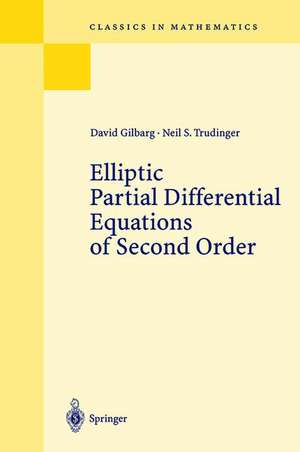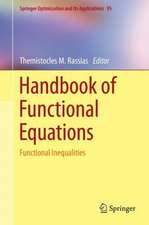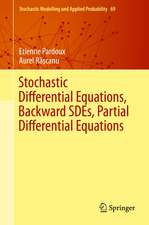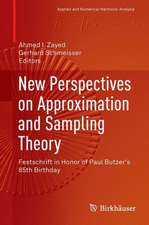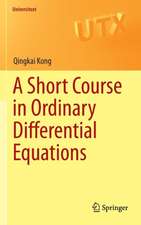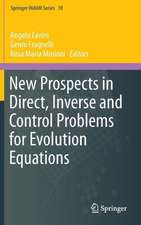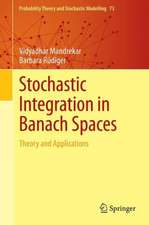Elliptic Partial Differential Equations of Second Order: Classics in Mathematics, cartea 224
Autor David Gilbarg, Neil S. Trudingeren Limba Engleză Paperback – 12 ian 2001
"This is a book of interest to any having to work with differential equations, either as a reference or as a book to learn from. The authors have taken trouble to make the treatment self-contained. It (is) suitable required reading for a PhD student. Although the material has been developed from lectures at Stanford, it has developed into an almost systematic coverage that is much longer than could be covered in a year's lectures". Newsletter, New Zealand Mathematical Society, 1985
" ... as should be clear from the previous discussion, this book is a bibliographical monument to the theory of both theoretical and applied PDEs that has not acquired any flaws due to its age. On the contrary, it remains a crucial and essential tool for the active research in the field. In a few words, in my modest opinion, “. . . this book contains the essential background that a researcher in elliptic PDEs should possess the day s/he gets a permanent academic position. . . .” SIAM Newsletter
Din seria Classics in Mathematics
-
 Preț: 404.18 lei
Preț: 404.18 lei -
 Preț: 419.15 lei
Preț: 419.15 lei -
 Preț: 400.47 lei
Preț: 400.47 lei -
 Preț: 404.34 lei
Preț: 404.34 lei -
 Preț: 422.11 lei
Preț: 422.11 lei -
 Preț: 438.87 lei
Preț: 438.87 lei -
 Preț: 431.56 lei
Preț: 431.56 lei -
 Preț: 425.80 lei
Preț: 425.80 lei -
 Preț: 429.61 lei
Preț: 429.61 lei -
 Preț: 421.72 lei
Preț: 421.72 lei -
 Preț: 425.80 lei
Preț: 425.80 lei -
 Preț: 422.90 lei
Preț: 422.90 lei -
 Preț: 427.49 lei
Preț: 427.49 lei -
 Preț: 421.17 lei
Preț: 421.17 lei -
 Preț: 415.39 lei
Preț: 415.39 lei -
 Preț: 485.07 lei
Preț: 485.07 lei -
 Preț: 437.72 lei
Preț: 437.72 lei -
 Preț: 444.47 lei
Preț: 444.47 lei -
 Preț: 440.39 lei
Preț: 440.39 lei -
 Preț: 447.73 lei
Preț: 447.73 lei -
 Preț: 438.10 lei
Preț: 438.10 lei -
 Preț: 509.50 lei
Preț: 509.50 lei -
 Preț: 418.83 lei
Preț: 418.83 lei -
 Preț: 436.74 lei
Preț: 436.74 lei -
 Preț: 446.37 lei
Preț: 446.37 lei -
 Preț: 430.59 lei
Preț: 430.59 lei -
 Preț: 421.93 lei
Preț: 421.93 lei -
 Preț: 429.06 lei
Preț: 429.06 lei -
 Preț: 431.56 lei
Preț: 431.56 lei -
 Preț: 457.36 lei
Preț: 457.36 lei -
 Preț: 429.99 lei
Preț: 429.99 lei -
 Preț: 504.66 lei
Preț: 504.66 lei -
 Preț: 433.31 lei
Preț: 433.31 lei -
 Preț: 418.07 lei
Preț: 418.07 lei -
 Preț: 428.07 lei
Preț: 428.07 lei -
 Preț: 427.33 lei
Preț: 427.33 lei -
 Preț: 437.50 lei
Preț: 437.50 lei -
 Preț: 425.80 lei
Preț: 425.80 lei -
 Preț: 438.26 lei
Preț: 438.26 lei -
 Preț: 408.61 lei
Preț: 408.61 lei -
 Preț: 432.51 lei
Preț: 432.51 lei -
 Preț: 429.61 lei
Preț: 429.61 lei -
 Preț: 435.20 lei
Preț: 435.20 lei -
 Preț: 428.68 lei
Preț: 428.68 lei -
 Preț: 437.12 lei
Preț: 437.12 lei -
 Preț: 438.69 lei
Preț: 438.69 lei
Preț: 402.27 lei
Nou
Puncte Express: 603
Preț estimativ în valută:
76.97€ • 80.21$ • 63.73£
76.97€ • 80.21$ • 63.73£
Carte disponibilă
Livrare economică 13-27 martie
Livrare express 26 februarie-04 martie pentru 49.90 lei
Preluare comenzi: 021 569.72.76
Specificații
ISBN-13: 9783540411604
ISBN-10: 3540411607
Pagini: 544
Ilustrații: XIII, 518 p.
Dimensiuni: 155 x 235 x 29 mm
Greutate: 0.79 kg
Ediția:Reprint of the 2nd ed. Berlin Heidelberg New York 1983. Corr. 3rd printing 1998
Editura: Springer Berlin, Heidelberg
Colecția Springer
Seria Classics in Mathematics
Locul publicării:Berlin, Heidelberg, Germany
ISBN-10: 3540411607
Pagini: 544
Ilustrații: XIII, 518 p.
Dimensiuni: 155 x 235 x 29 mm
Greutate: 0.79 kg
Ediția:Reprint of the 2nd ed. Berlin Heidelberg New York 1983. Corr. 3rd printing 1998
Editura: Springer Berlin, Heidelberg
Colecția Springer
Seria Classics in Mathematics
Locul publicării:Berlin, Heidelberg, Germany
Public țintă
ResearchCuprins
1. Introduction.- I. Linear Equations.- 2. Laplace’s Equation.- 3. The Classical Maximum Principle.- 4. Poisson’s Equation and the Newtonian Potential.- 5. Banach and Hubert Spaces.- 6. Classical Solutions; the Schauder Approach.- 7. Sobolev Spaces.- 8. Generalized Solutions and Regularity.- 9. Strong Solutions.- II. Quasilinear Equations.- 10. Maximum and Comparison Principles.- 11. Topological Fixed Point Theorems and Their Application.- 12. Equations in Two Variables.- 13. Hölder Estimates for the Gradient.- 14. Boundary Gradient Estimates.- 15. Global and Interior Gradient Bounds.- 16. Equations of Mean Curvature Type.- 17. Fully Nonlinear Equations.- Epilogue.- Notation Index.
Recenzii
“This book is a bibliographical monument to the theory of both theoretical and applied PDEs that has not acquired any flaws due to its age. On the contrary, it remains a crucial and essential tool for the active research in the field.” (Francesco Petitta, SIAM Review, Vol. 61 (4), December, 2019)
From the reviews:
"The aim of the book is to present "the systematic development of the general theory of second order quasilinear elliptic equations and of the linear theory required in the process". The book is divided into two parts. The first (Chapters 2-8) is devoted to the linear theory, the second (Chapters 9-15) to the theory of quasilinear partial differential equations. These 14 chapters are preceded by an Introduction (Chapter 1) which expounds the main ideas and can serve as a guide to the book. ...The authors have succeeded admirably in their aims; the book is a real pleasure to read".
Mathematical Reviews,1986
"Advanced students and professionals are snapping up this paperback text on linear and quasilinear partial differential equations. Whether you use their book as textbook or reference, the authors give you plenty to think about and work on, including an epilogue summarizing the latest research."
Amazon.com delivers Mathematics and Statistics e-bulletin, July 2001
"The aim of the book is to present "the systematic development of the general theory of second order quasilinear elliptic equations and of the linear theory required in the process". The book is divided into two parts. The first (Chapters 2-8) is devoted to the linear theory, the second (Chapters 9-15) to the theory of quasilinear partial differential equations. These 14 chapters are preceded by an Introduction (Chapter 1) which expounds the main ideas and can serve as a guide to the book. ...The authors have succeeded admirably in their aims; the book is a real pleasure to read".
Mathematical Reviews,1986
"Advanced students and professionals are snapping up this paperback text on linear and quasilinear partial differential equations. Whether you use their book as textbook or reference, the authors give you plenty to think about and work on, including an epilogue summarizing the latest research."
Amazon.com delivers Mathematics and Statistics e-bulletin, July 2001
Notă biografică
Biography of David Gilbarg
David Gilbarg was born in New York in 1918, and was educated there through udergraduate school. He received his Ph.D. degree at Indiana University in 1941. His work in fluid dynamics during the war years motivated much of his later research on flows with free boundaries. He was on the Mathematics faculty at Indiana University from 1946 to 1957 and at Stanford University from 1957 on. His principal interests and contributions have been in mathematical fluid dynamics and the theory of elliptic partial differential equations.
Biography of Neil S. Trudinger
Neil S. Trudinger was born in Ballarat, Australia in 1942. After schooling and undergraduate education in Australia, he completed his PhD at Stanford University, USA in 1966. He has been a Professor of Mathematics at the Australian National University, Canberra since 1973. His research contributions, while largely focussed on non-linear elliptic partial differential equations, have also spread into geometry, functional analysis and computational mathematics. Among honours received are Fellowships of the Australian Academy of Science and of the Royal Society of London.
David Gilbarg was born in New York in 1918, and was educated there through udergraduate school. He received his Ph.D. degree at Indiana University in 1941. His work in fluid dynamics during the war years motivated much of his later research on flows with free boundaries. He was on the Mathematics faculty at Indiana University from 1946 to 1957 and at Stanford University from 1957 on. His principal interests and contributions have been in mathematical fluid dynamics and the theory of elliptic partial differential equations.
Biography of Neil S. Trudinger
Neil S. Trudinger was born in Ballarat, Australia in 1942. After schooling and undergraduate education in Australia, he completed his PhD at Stanford University, USA in 1966. He has been a Professor of Mathematics at the Australian National University, Canberra since 1973. His research contributions, while largely focussed on non-linear elliptic partial differential equations, have also spread into geometry, functional analysis and computational mathematics. Among honours received are Fellowships of the Australian Academy of Science and of the Royal Society of London.
